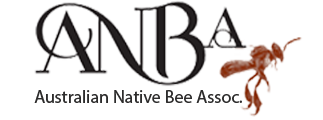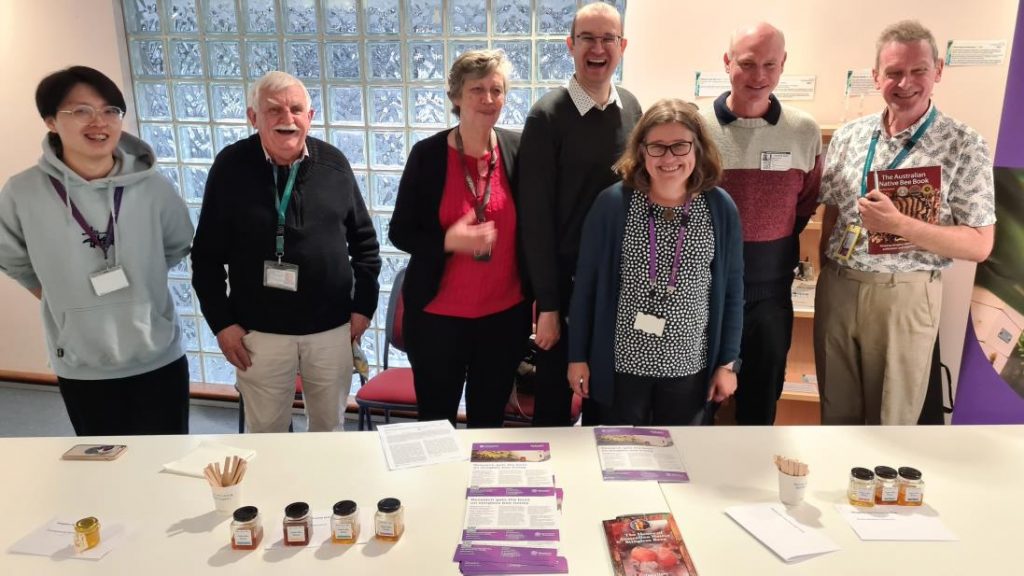Let’s reflect on what we have done so far…
Created the Australian Native Bee Association
This was originally started for the purpose of advancing honey, but of course once we started down the track to create an incorporated, not for profit community group, this expanded to become a focus for all native bees, not just stingless bees. This association continues to grow, with over 800 members, and branches in multiple states of Australia. This member base has supported and provided funding to the honey committee.
Formed the honey committee
We have not just formed the committee but harnessed the good spirits and team work of a group of people working together. Many thanks to all the members, who have contributed large or small amounts, or provided advice or technical knowledge and insights. The honey committee are: Peter Abbot, Tony Blackwell, Dean Haley, Tim Heard, Ann Ross, Giorgio Venturieri, Trevor Weatherhead & Norhasnida Ziwawi.
Supported Research
Supported Professor Fletcher’s team with honey samples and $5,500 cash resulted in an Agrifutures grant of $50,000 which has materially supported our honey work, and our application. The research team from University of QLD, and QAAFI (QLD Alliance for Agriculture and Food Innovation) have produced several scientific articles, as well as newspaper/ online articles which significantly promoted native bee honey to the wider community. The re-search has provided valuable insight into a major component (trehalulose) of the food.
Many thanks to Professor Mary Fletcher, Dr Natasha Hungerford, Dr Tobias Smith who undertook this work, as well as technical expertise of their scientific team. One of the team was Uni student Jiali Zhang, who obtained first class honours as a result of his work on the honey projects.
Performed our own analyses
Another $5,000 of sample analysis for food testing and “standard” honey analysis, specifically to close knowledge gaps and directly support the application process. This has contributed to our knowledge of physicochemistry and food microbiology of our honey. All the honey samples used for this analysis was donated by members and you deserve our sincere thanks.
Gained consensus for a name
Via an online poll of our ANBA member base. The name ‘Native Bee Honey’ was a clear winner, squeezing out other names such as Stingless Bee Honey.
Written a book
Dean Haley wrote “The Honey of Australian Native Stingless Bees”. This supported the application by showing standardised techniques for honey har-vesting, as well as supporting honey producers with knowledge of basic (state) food safety legislation. This was originally intended to be a pamphlet but grew a bit.
Wrote an application to amend the Australian New Zealand Food Standards
After 3 years and 20 draft versions, the honey committee applied to Food Standards Australia New Zealand (FSANZ) to recognise Native Bee Honey as a standardised food. Special mention to Peter Abbot for amazing attention to detail and technical excellence in preparing this document.
It is not an easy task to prepare a document of this nature. It must meet the formatting and technical requirements of FSANZ, and meet all of the required criteria. Nearly 50 referenced documents needed to be collected, collated, and supplied as supporting evidence.
Where to from here?
Food Standards Australia New Zealand accepted our application on 26th July 2022, and have indicated that the application meets the technical and for-matting requirements. They have indicated that
there are several areas they will consider when judging our application. Unfortunately, there is a considerable backlog of applications in front of ours, & it’s likely that work on our application will not be complete until part way through 2024.
We have come a long way already though. Even by getting to this stage where we have submitted the application to FSANZ, it means that we have considered many important questions regarding Food Safety, Physical Characteristics, & Chemical Stability of Native Bee Honey. This should provide at least some assurance to honey producers, and consumers that we are serious about this sweet & sour product of our very special, Australian native stingless bees.
Dean Haley
EXCITING NEWS: Jiali has just recently been awarded a UQ international scholarship for the remainder of his PhD “Stingless bee enzymes for biotransformation of sucrose to a low GI sugar”. The support from ANBA has been a significant contributor in making this happen.

